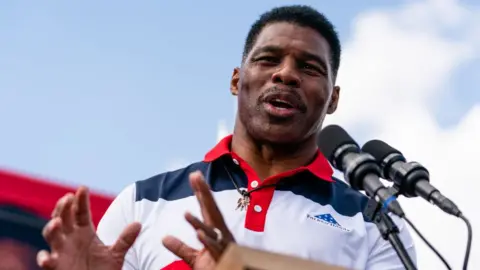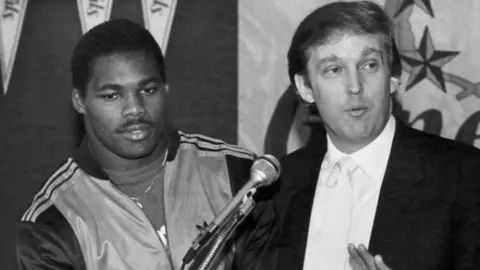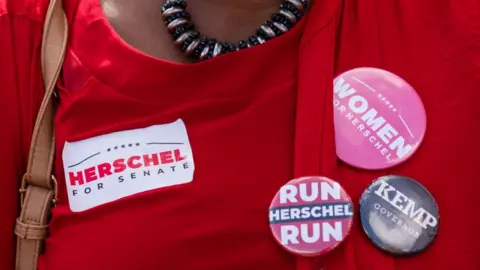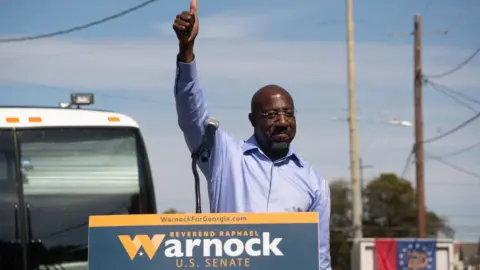Herschel Walker: Will abortion sink Georgia's Trump-backed Republican?
 Getty Images
Getty ImagesA Senate race in Georgia will be crucial to determining control of Congress. But can a controversial football legend deliver the state back to the party of Trump?
"Bad to the Bone" seemed a daring song to blast as Herschel Walker's bus pulled up to a recent campaign stop in Carrollton.
After all, the Republican Senate candidate, 60, has faced serious accusations from women in his past.
An African-American former professional football legend now seeking to deliver the upper chamber of Congress to former President Donald Trump's party, Mr Walker has run on a platform of social conservatism rooted in anti-abortion, anti-transgender rights and pro-'traditional family' policies. However, he has made national headlines in recent weeks after it emerged that he allegedly paid for a former girlfriend's abortion, and was accused by one of his sons of abuse and neglect.
Yet the rollicking strains of George Thorogood's ode to womanising played on as several dozen supporters cheered Mr Walker.
"I'll make a rich woman beg, and I'll make a good woman steal," Mr Thorogood crooned. "I'm here to tell ya, honey, that I'm bad to the bone."
But before Mr Walker emerged, the soundtrack abruptly switched to God Bless the USA, a squeaky-clean patriotic ballad that became popular after the 11 September 2001 attacks. Mr Walker stepped into the Georgia sunshine, and the crowd went wild.
As it turns out, this auditory choreography is a good analogy for Mr Walker's unconventional campaign.
The Republican is attempting to pull off a similar about-face with his image, as a Senate race that could decide which party controls Congress comes down to the wire.
Running on a message of redemption, renewal and rejection of the left, Mr Walker is taking a page out of a playbook that worked well for his political inspiration, Mr Trump - betting that it is the vision of America he represents, not the "sinner" that he was, that will matter to voters in this crucial southern US state.
 Getty Images
Getty ImagesJust as many people first knew Mr Trump not from politics but from his stint on the reality television show The Apprentice, many Georgians know Mr Walker for his status as a home-grown sports god. He was the superstar player of his university American football team at the University of Georgia and had a professional career of over a decade - including playing for the New Jersey Generals, a team then owned by Mr Trump.
That set him up to barnstorm the Republican Senate primary earlier this year - against Mr Walker's enormous name recognition and Trumpian bona fides, his conservative competitors didn't stand a chance. Republicans itched for a celebrity who could square off against Georgia's well-known sitting Senator, Raphael Warnock.
But while Mr Walker enjoyed public adoration during his prime football years, privately, he struggled with personal demons.
The more troubling details from this period in his life have become a foundational narrative in his campaign, overshadowing any of his positions, except on abortion.
Unlike Mr Trump - who frequently denies misdeeds attributed to him - Mr Walker says that he has, quite literally, been an open book. In 2008, he wrote a confessional memoir - Breaking Free: My Life with Dissociative Identity Disorder - in which he publicly acknowledged many of the darker aspects of his past, including his struggle with the mental illness and the violent behaviour he said it caused.
(In a recent debate, Mr Walker said he no longer has dissociative identity disorder and is not receiving treatment for the condition.)
Two women, including his ex-wife Cindy Grossman, have accused him of domestic abuse, with Ms Grossman previously telling ABC News that he once pointed a gun at her head.
At another point, he threatened a shootout with police, the Associated Press reported - and was accused of threatening to shoot another former girlfriend, which he denied.
Some of this behaviour allegedly happened 20 years ago and has been known for over a decade. But as the general election unfolded, it was claimed that his previous confessions had skipped some details.
According to the Daily Beast this month, Mr Walker paid for a former girlfriend's abortion in 2009, despite now supporting a nationwide ban on the procedure. The news outlet also reported that Mr Walker, who has spoken out against absent fathers in the black community, has a 10-year-old son he does not see, and that he had three more children than he's publicly acknowledged during the campaign, all with different mothers.
His most publicly visible child, a conservative social media influencer named Christian Walker, has accused his father of abandoning and threatening him and his mother.
The Republican has denied that he'd concealed his other children or that he'd paid for an abortion - though he did admit that he wrote a cheque to the woman, saying he didn't know what it was for.
 Getty Images
Getty ImagesAll that did not seem to bother Nancy Hollingshed, 68.
Carrying a pink "Women for Herschel" sign and sporting fuchsia sunglasses to match, the Dallas, Georgia, resident told the BBC that those who believe in Mr Walker "all believe in redemption", too.
"I know that he came out and talked about his past," she said. "But you know, we all have a past. Herschel has asked for forgiveness. He wrote a book about it. He's gotten help. His wife now is travelling everywhere with him. If you've met him you'll see that he [received] the redemption that he has asked God for."
Several people arrived at the Carrollton rally with anti-abortion signs, though they said their intention was to support, not shame Mr Walker.
Over and over again, Mr Walker's supporters said they believe he has already atoned. Some wrote off the reports of the abortion. Other said they cared less about whether or not the reports were true, and more about the person Mr Walker says he is today.
"There's people that have murdered people and they've been forgiven," said Bobbi Mohlman, a pensioner, who turned up with her husband, Ted, at a Republican party event in Savannah with their boisterous rescue hound, "Herschel Walker".
The dog wore a bright red jacket monogrammed with the candidate's name.
"I've done things in my life that I'm not happy with. But the best part of being a Christian is Jesus forgives you and gives you another chance," Mrs Mohlman said.

Hanging on to religious conservatives is essential for a Republican in Georgia, and Mr Walker's talk of redemption is ideally calibrated for keeping them, said Charles Bullock, a political science professor at the University of Georgia.
By contrast, Mr Walker accused his rival, Mr Warnock - a pastor who preaches at the church once presided over by Martin Luther King Jr - of being a man who does not "believe in redemption".
During their televised debate, he assailed Mr Warnock over reports that his church has been evicting low-income tenants from apartments it owns. Walker supporters have also aired an attack ad reminding voters of an allegation by Mr Warnock's ex-wife that he ran over her foot in a car during a March 2020 domestic dispute.
On the campaign trail, Mr Walker evinces a persona halfway between a self-help guru and a soft-spoken preacher. His cadence sometimes seems more suited for the pulpit than the podium. He tends to speak in parable, and told the car park crowd in Carrollton an extended tale about the need to choose heaven over hell.
For some voters, it was difficult to reconcile that image with what allegedly took place behind closed doors.
"I keep on hearing on TV that, you know, he paid for a woman's abortion, you know, he stuck a gun to his ex-wife's temple, to her head," said Brian Ramsey, 49, who waited in line for Mr Walker to sign his hat after the rally. "Just to me, it doesn't seem like him."
Whether the forgiveness of his supporters can propel him to the US Senate remains to be seen.
Recent polling has Mr Walker in a dead heat with Mr Warnock - even though Georgia's Republican governor Brian Kemp has opened up a double-digit lead against his Democratic opponent.
The problem for Mr Walker, said Mr Bullock, is that though he can rely on a solid base of conservative voters for whom "it doesn't matter if he [paid for] a dozen abortions or 16 illegitimate children" - each new revelation is likely to cost him others.
"Five thousand here, ten thousand there - it's a death from a thousand cuts."
And, perhaps ironically for Mr Walker - who wrote poignantly of his childhood fears of the KKK in the segregated US South - he is struggling to make up the difference with appeals to Georgia's other powerful voting bloc: African Americans.
Both of Georgia's Senate candidates are black, but Mr Walker is only winning 2% of the black vote, compared to Mr Warnock's 89%, a University of Georgia poll found.
This is partly due to partisan preferences: Georgia's black voters tend to vote for Democrats.
 Getty Images
Getty ImagesBut critics say Mr Walker has made explicit appeals to white voters by decrying "wokeness" and condemning critical race theory, a teaching that racism is systemic in US institutions and that this serves to maintain the dominance of white people.
Ultimately, Mr Walker's fate rests in the hands of more moderate Republicans in the suburbs, whom he is counting on to vote for the conservative policies he supports despite his personal flaws.
Jennifer Almond, 49, opposes abortion and government spending, and said she would certainly vote for Mr Kemp, a Republican, for governor.
But she paused on Mr Walker for Senate.
"I had heard briefly about the stuff going on with his ex-wife," she said. "And that kind of bothers me."
High turnout during the early voting period suggests Georgians are engaged in this year's elections, and they might have to make more than one trip to the polls. Should no Senate candidate win 50% of the vote on 8 November, the top two vote-getters will advance to a runoff in early December. Those exact conditions, in 2021, propelled Mr Warnock to the Senate.
Only when the race is finally called will it be clear whether Mr Walker's redemption tour has worked.
